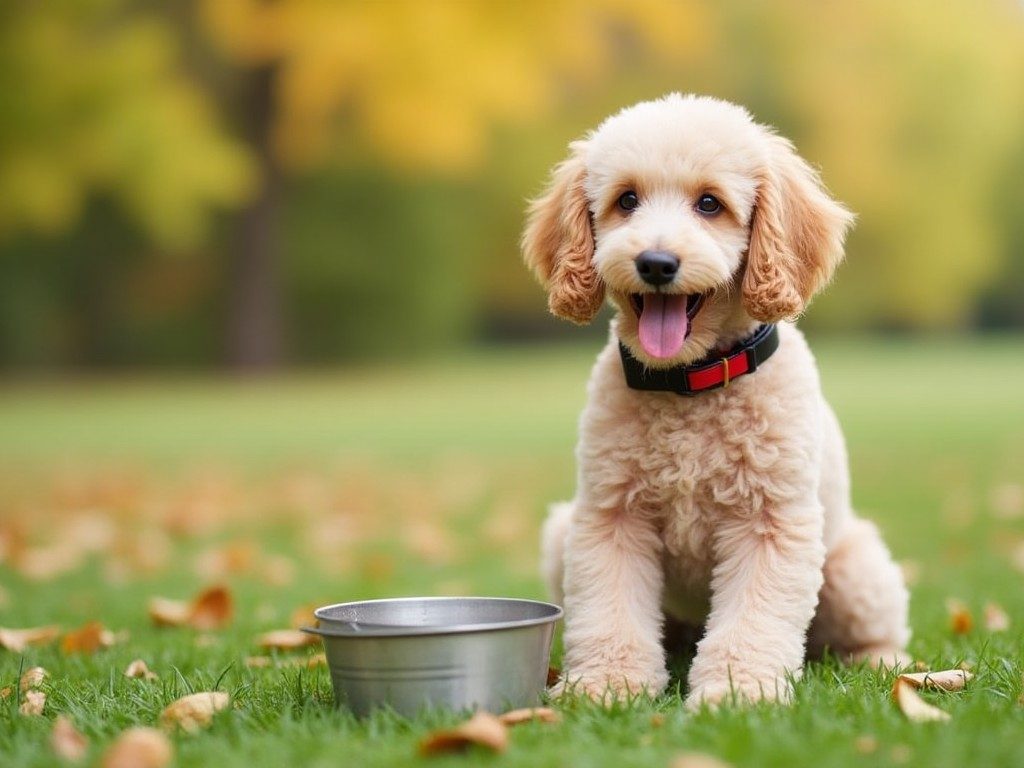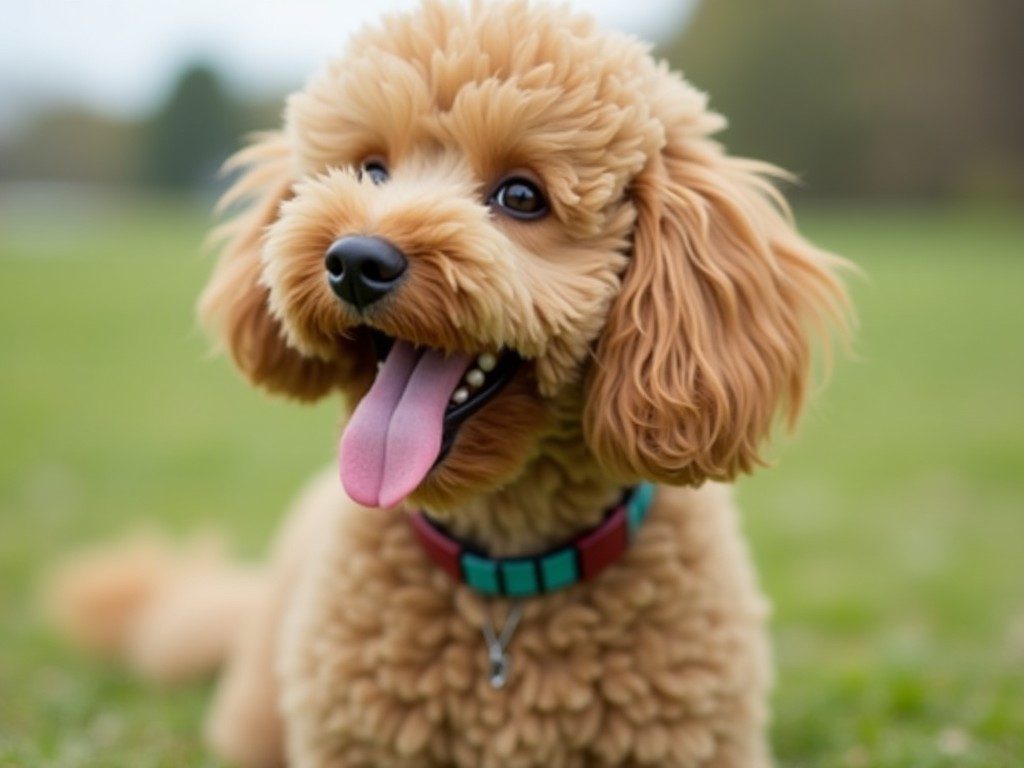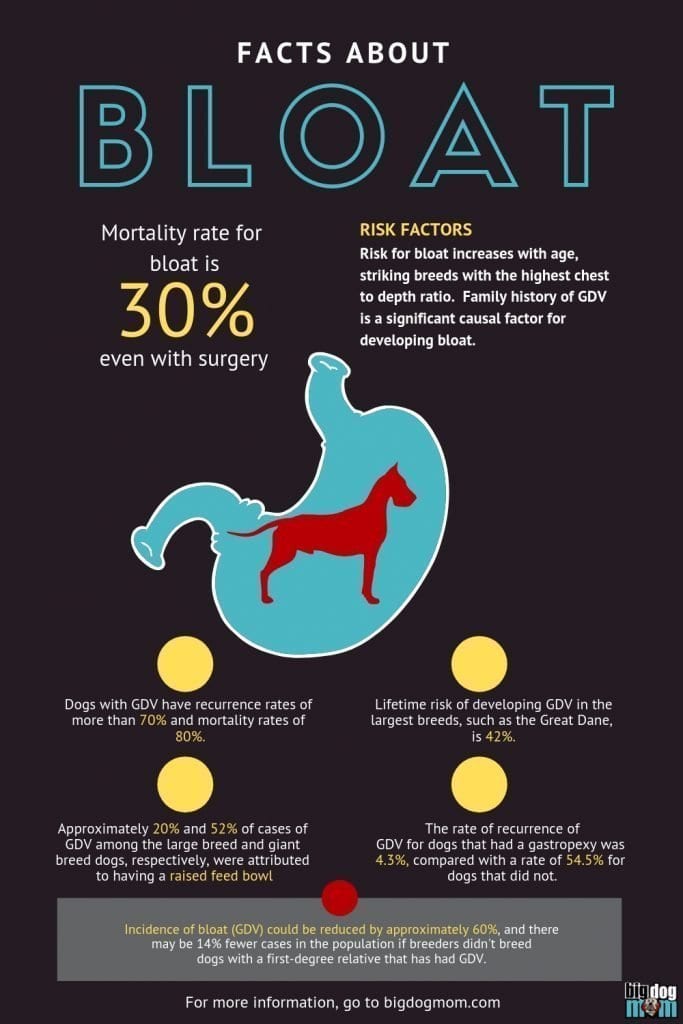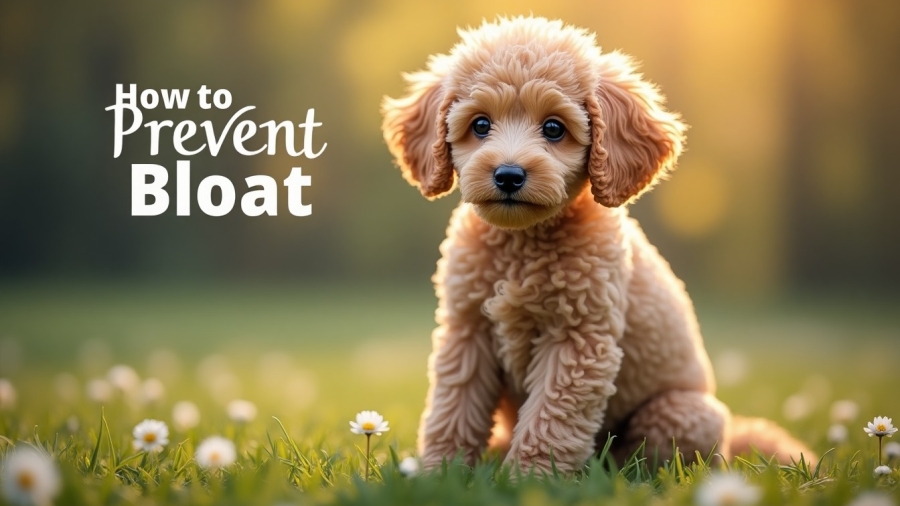Preventing bloat in poodles is crucial for their health. This condition can be life-threatening.
Bloat, also known as gastric dilatation-volvulus (GDV), affects many dogs, especially deep-chested breeds like poodles. It happens when a dog’s stomach fills with gas and twists, leading to severe pain and potentially fatal outcomes. Understanding the signs and knowing how to prevent bloat can save your dog’s life.
This blog will guide you through simple steps to protect your poodle from this dangerous condition. By following these tips, you can ensure a healthier and happier life for your furry friend. Keep reading to learn more about preventing bloat in poodles.
Understanding Bloat In Poodles
Bloat is a serious condition that can affect poodles. It can be life-threatening if not treated quickly. Knowing the signs and how to prevent it can save your dog’s life.
What Is Bloat?
Bloat, also known as Gastric Dilatation-Volvulus (GDV), occurs when a dog’s stomach fills with gas, food, or fluid, making it expand. The stomach can then twist, trapping the contents and cutting off blood supply.
This condition can develop rapidly and requires immediate veterinary attention. Bloat is more common in large, deep-chested breeds, but poodles can also be at risk.
Symptoms To Watch For
Recognizing the symptoms of bloat early can make a huge difference. Here are some signs to watch for:
- Swollen abdomen: Your dog’s belly may look visibly enlarged.
- Restlessness: Your dog may have trouble getting comfortable.
- Unproductive retching: They may try to vomit but nothing comes out.
- Excessive drooling: More saliva than usual can be a sign.
- Pale gums: Check your dog’s gums for paleness.
- Rapid heartbeat: A fast pulse can indicate distress.
- Weakness or collapse: Your dog may appear weak or even collapse.
If you notice any of these symptoms, contact your vet immediately. Quick action is crucial.
| Symptom | Description |
|---|---|
| Swollen abdomen | Enlarged belly, often firm to the touch |
| Restlessness | Inability to find a comfortable position |
| Unproductive retching | Attempting to vomit without success |
| Excessive drooling | More saliva than normal |
| Pale gums | Gums appear lighter than usual |
| Rapid heartbeat | Heart rate much faster than normal |
| Weakness or collapse | Dog appears weak or may collapse |
Causes Of Bloat
Bloat, also known as gastric dilatation-volvulus (GDV), is a serious condition in poodles. Understanding the causes can help prevent this life-threatening issue. Here, we explore the main factors contributing to bloat in poodles.
Dietary Factors
Diet plays a significant role in bloat. Certain foods and feeding habits can increase the risk.
- Large meals: Feeding your poodle one large meal a day can cause bloat. Split meals into smaller portions.
- Rapid eating: Dogs that eat too fast are at higher risk. Use a slow feeder bowl to prevent this.
- High-fat diets: Foods high in fat can contribute to bloat. Choose low-fat dog food for your poodle.
- Dry kibble: Some dry kibble can expand in the stomach. Soaking kibble in water can help reduce this risk.
Genetic Predisposition
Genetics can also play a role in the development of bloat in poodles.
- Breed-specific risks: Poodles, especially standard poodles, are more prone to bloat.
- Family history: If a poodle’s relatives have experienced bloat, the risk increases.
- Age: Older dogs are more susceptible to bloat. Regular vet check-ups can help monitor their health.
By understanding these causes, you can take steps to protect your poodle from bloat. Always consult with your veterinarian for personalized advice.
Dietary Precautions
Bloat, also known as gastric torsion or gastric dilatation-volvulus (GDV), is a serious condition in poodles. It can be life-threatening if not addressed promptly. One way to help prevent bloat is by taking dietary precautions. These measures can make a significant difference in your poodle’s health and well-being.
Choosing The Right Food
Choosing the right food is crucial. Look for high-quality, easily digestible food. Avoid foods with too many fillers, like corn or soy. High-protein diets can be beneficial. They help maintain muscle mass and overall health. Avoid foods with excessive fat content. Fatty foods can increase the risk of bloat.
Consider a diet with a mix of wet and dry food. Wet food can help with hydration. It can also reduce the risk of bloat. Dry food should be chosen carefully. Opt for kibble that is not too large. Large kibble can expand in the stomach, causing issues.
Feeding Schedule Tips
Feeding schedule plays a key role in preventing bloat. Feed your poodle smaller meals several times a day. Instead of one large meal, divide their food into two or three portions. This helps reduce the risk of the stomach expanding too quickly.
Avoid vigorous exercise right after meals. Let your dog rest for at least an hour after eating. This can help prevent the stomach from twisting. Do not let your dog drink large amounts of water immediately before or after meals. A moderate amount is fine, but too much can cause bloat.
Establish a routine. Feed your dog at the same times every day. This helps their digestive system work more efficiently.
| Feeding Tips | Benefits |
|---|---|
| Small, frequent meals | Reduces stomach expansion risk |
| Rest after meals | Prevents stomach twisting |
| Moderate water intake | Reduces risk of bloat |
By following these dietary precautions, you can help protect your poodle from bloat. Small changes in their diet and feeding schedule can have a big impact. Keep your poodle healthy and happy with these simple steps.

Exercise And Activity
Exercise and activity play a crucial role in keeping your poodle healthy. They help in maintaining a proper digestive system, which can prevent bloat. Proper exercise routines and rest periods can make a significant difference.
Pre-meal Exercise
Ensure your poodle gets exercise before meals. This helps in proper digestion. A short walk or playtime 30 minutes before feeding is ideal.
- Short walks: 15-20 minutes walk
- Playtime: Fetch or tug-of-war
This routine can help in reducing the risk of bloat. Avoid strenuous exercise, which can cause stress to the stomach.
Post-meal Rest
After meals, let your poodle rest. This allows food to settle properly. A calm environment helps in digestion.
- Rest period: 30-60 minutes
- Quiet space: Away from distractions
Prevent your poodle from jumping or running post-meal. This can lead to stomach issues and increase the risk of bloat.
Hydration Management
Hydration Management is crucial to prevent bloat in poodles. Proper water intake keeps your poodle healthy and active. Follow these guidelines to manage your poodle’s hydration effectively.
Water Intake Guidelines
Ensure your poodle drinks enough water daily. Too little or too much can cause problems. Here’s a simple guideline:
- Provide fresh water at all times.
- Monitor their water bowl regularly.
- Replace the water daily to keep it clean.
The amount of water depends on your poodle’s size and activity level. As a rule of thumb:
| Weight of Poodle | Daily Water Intake |
|---|---|
| 10 pounds | 1 cup |
| 20 pounds | 2 cups |
| 30 pounds | 3 cups |
Avoiding Overhydration
While hydration is vital, too much water can be harmful. Overhydration can lead to bloat in poodles. Here are some tips to avoid overhydration:
- Do not let your poodle drink large amounts at once.
- Offer smaller amounts of water frequently.
- Monitor their water intake during and after play or exercise.
By managing your poodle’s hydration, you can help prevent bloat. Keep an eye on their water intake and adjust as needed.
Preventive Medical Measures
Preventing bloat in poodles involves more than just dietary changes. Medical measures are also essential. Regular vet checkups and potential surgical options can significantly reduce the risk. Here’s how these measures can help keep your poodle safe and healthy.
Regular Vet Checkups
Regular vet checkups are crucial for your poodle’s health. These visits help identify potential issues early. Vets can monitor your dog’s overall health and detect signs of bloat early. Here are some benefits of regular vet checkups:
- Early detection of health problems
- Professional advice on diet and exercise
- Regular monitoring of your poodle’s weight and growth
- Updated vaccinations and preventive treatments
Ensure you schedule vet visits at least twice a year. This regularity helps in maintaining your dog’s health. Don’t wait for symptoms to appear. Proactive care is key.
Possible Surgical Options
For poodles at high risk of bloat, surgical options may be considered. One common procedure is gastropexy. This surgery attaches the stomach to the abdominal wall. It helps prevent the stomach from twisting. Here’s more about gastropexy:
| Procedure | Benefits | Considerations |
|---|---|---|
| Gastropexy | Reduces risk of stomach twisting | Requires anesthesia |
Discuss with your vet if this surgery is suitable for your poodle. They can provide detailed information and guidance.
Remember, preventive medical measures are a vital part of protecting your poodle from bloat. Regular vet visits and considering surgical options can make a significant difference.
Recognizing Early Signs
Preventing bloat in Poodles starts with recognizing early signs. Bloat can be life-threatening, so early detection is crucial. Understanding both behavioral changes and physical indicators helps protect your furry friend.
Behavioral Changes
- Restlessness: Watch for signs of restlessness or pacing.
- Anxiety: Your Poodle may seem anxious or unsettled.
- Unusual Posture: Notice if your dog tries to stretch or assumes unusual positions.
- Panting: Excessive panting without physical exertion can be a red flag.
- Avoiding Food: A sudden loss of interest in food may indicate discomfort.
Physical Indicators
- Distended Abdomen: A swollen or enlarged abdomen is a key sign.
- Excessive Drooling: Drooling more than usual can signal bloat.
- Rapid Heart Rate: Check for an unusually fast heartbeat.
- Vomiting: Attempting to vomit without producing anything is concerning.
- Pale Gums: Gums may appear pale or have a bluish tint.
By paying close attention to these early signs, you can act quickly. Early intervention can make a significant difference in preventing bloat in your Poodle.

Emergency Response
Knowing how to respond in a bloat emergency can save your poodle’s life. Quick action is critical. Below are the steps to take in such situations.
Immediate Actions
If you suspect your poodle has bloat, act fast. Time is crucial.
- Stay calm: Your poodle needs you to stay composed.
- Avoid giving food or water: It can worsen the condition.
- Gently move your poodle: Help them lie on their right side.
- Contact your vet: Call them right away for guidance.
Getting Professional Help
Professional help is vital in treating bloat. Follow these steps:
- Call your vet: Inform them about the emergency.
- Transport your poodle: Take them to the vet immediately.
- Prepare for surgery: Your vet might need to perform surgery to treat the bloat.
- Follow post-treatment care: Adhere to all aftercare instructions given by your vet.
| Steps | Actions |
|---|---|
| Immediate Actions | Stay calm, avoid food/water, gently move, contact vet |
| Getting Professional Help | Call vet, transport poodle, prepare for surgery, follow post-care |

Frequently Asked Questions
What Causes Bloat In Poodles?
Bloat in poodles is caused by excessive gas buildup in the stomach. It can be triggered by eating too fast, consuming large meals, or drinking a lot of water quickly. Stress and excessive exercise after eating can also contribute.
How Can I Prevent Bloat In My Poodle?
To prevent bloat, feed your poodle smaller, more frequent meals. Avoid vigorous exercise immediately after eating. Use slow-feed bowls to reduce the speed of eating. Ensure they have access to water throughout the day.
Are Certain Foods More Likely To Cause Bloat?
Yes, certain foods can increase the risk of bloat. Avoid feeding your poodle foods high in fat or grains. Stick to high-quality, balanced dog foods. Consult your vet for specific dietary recommendations.
What Are The Symptoms Of Bloat In Poodles?
Symptoms of bloat in poodles include a swollen abdomen, restlessness, drooling, and unsuccessful attempts to vomit. They may also show signs of distress and discomfort. If you notice these symptoms, seek veterinary care immediately.
Conclusion
Preventing bloat in poodles is crucial for their health. Follow these simple steps to protect your furry friend. Feed smaller, frequent meals. Limit intense exercise after eating. Ensure clean, fresh water is always available. Avoid stress and rapid food changes.
Regular vet check-ups help catch early signs. By taking these steps, you can keep your poodle happy and healthy. Your dog’s well-being depends on your care and attention. Stay vigilant and proactive.

